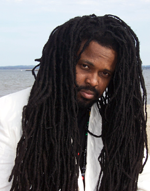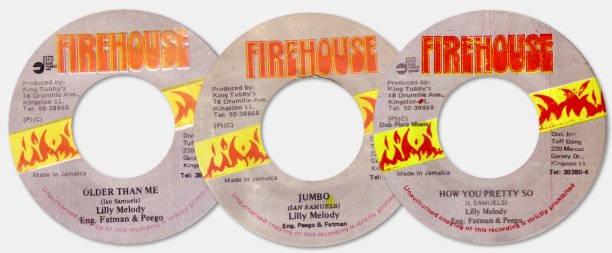Articles about reggae music, reviews, interviews, reports and more...
Isiah Mentor : Roots and Culture Teacher
- Home
- Articles
- Interviews
- Isiah Mentor : Roots and Culture Teacher

Isiah Mentor : Roots and Culture Teacher
United Reggae interviewed the Jamaican singer, known in the 1980's as Lilly Melody. Back on stage front and centre for the past few years, Isiah Mentor reminisces about his career and tells us about his present life and projects.
Sampler
 Those who appreciate 'early digital' style and dancehall music from the 1980's should know him as Lilly Melody. Since this era, Isiah Mentor kept his sweet and beautiful voice and only changed his name.
Those who appreciate 'early digital' style and dancehall music from the 1980's should know him as Lilly Melody. Since this era, Isiah Mentor kept his sweet and beautiful voice and only changed his name.
He never stopped being a reggae activist.
"After taking a few years from the biz to find out what Jah wants me to do, in a vision he told me that my name must be symbolic to my mission and that name most be Isiah Mentor, it means a teacher, a leader and one who has the vision to see ahead."
Real humanist, Isiah Mentor does not sing for entertainment but got a message to spread to mankind as his biggest hit Fight Fight Fight shows.
"I want to let people of the world know that politicians work for us and the people has the power to change their reality. I am here to burn out corruption and spread Jah teaching with love."
Native from Rae Town, Kingston, Jamaica, Ian Samuels aka Isiah Mentor raised in Spanish Town, St. Catherine, since the age of three. Music has always took a big part in his life.
"As a ten years old boy I was cleaning the floor with a coconut bow and rexo floor polish and singing the hit song 'Stealing Love On The Side' when my aunt heard me and called all my family members to listen to me, that's when I knew that I can sing."
Few times later, he did his first singing performance for the Ministry of Health in Jamaica at a rehabilation center for sick people.
King Tubby's era
Serious matters - if we can say - started with King Tubby's in Waterhouse.
"I was discovered by [King Tubby's] engineer named 'Professor' at a dance in Hold Harbour, St Catherine, Jamaica. He asked me to come to the studio to let the King hear me so I did just that and from that day we became a family, the Firehouse family. There I recorded a lot, worked on new projects that were distributed by Tuff Gong, Sonic Sounds and others major distributors on the island. At that time sound systems from all over the world like Coxon and Saxon, Stereo Malt, Stereo Gav, Arrows, just to name a few, were doing dub plates there frequently, and I was one of the artist there in the mix of things, alongside Anthony Redrose, King Kong, Wayne Palmer, King Everald and Banana Man just to name a few. We were like one big family that was very compete with each other, but it was all fun. Our chef at the time, the well known notorious Sandokan before we broke out to be most notorious. So we made music, our belly was full and we had a lot of fun at King Tubby."
During the 80's, Isiah Mentor released several dubplates and singles as Lilly Melody. His first release, Ghost Buster came out in 1986 on FireHouse.
"This song was recorded with the help of top Jamaican DJ Barry G, he left the studio with the mix version and played it on the radio in half an hour, I reached home and my friends and family heard me on the radio first time (…) I became the local star from that night."
Then came out singles Pressure Me, Older Than Me, How You Pretty, Jumbo on King Tubby's FireHouse label. In 1987, the singer relocated to the USA and recorded Big In A Bed that went number 2 in local chart. One year later, he also released a great LP entitled Give It To Me on Park Heights. This set features crucial early digital tunes as Sandra, Jah Guide and Give Me Your Loving.

'Those that see roots as dead maybe they are mentally dieing'
Isiah Mentor's airy and beautiful voice was already perceptible at this time. First influenced as a young man by Barrington Levy, Isiah Mentor said that "the first song [he] sang was Black Roses then Dennis Brown, Eddie Fitzroy, Mykal Rose, Ini Kamoze and Garnett Silk styles of singing motivate [his] style of singing now".
Whereas many artists from the 80's chose to turn to Dancehall music, Isiah Mentor is stuck to roots music. And when we ask him why does he prefer it to Dancehall -which actually rules in jamaican charts- he make no bones about it.
"Because Jah gave I a mission to do so. Roots music lives. The foundation of reggae music it's roots reggae which is the heart beat and it's still beating, it's one of the only music that deals with the good, the bad, and the ugliness of live, which is a reality. So those that see it as dead maybe they are mentally dieing."
Since the 2000's he released several tracks as Ghetto Children featured on his first rhythm driven CD Reggae Star Time Vol.1 released in 2004 on his own Village Roots label. It also includes the serious Do Good and Love Me For Me featuring Anthony B both on Plastic Smile Riddim. Keeping on delivering a message of love and unity, Isiah released others tunes as Cry Africa for B&M Records. For this one, he explains that he "did the song through the eyes of one woman with her dying child".
Recently, the singer produced Rasta Government, a heavy tune with serious lyrics. Producing strictly roots and culture music, he's now working on his own album for early 2008 and is about to release various singles with Tanya Stephens, Anthony B and Turbulence on Village Roots. A conscious artist to closely follow.
Comments actually desactivated due to too much spams
Browse by categories
Recommended Articles
Latest articles
Recently addedView all
© 2007-2025 United Reggae. All Rights Reserved. Reproduction in whole or in part is prohibited. Read about copyright
Terms of use | About us | Contact us | Authors | Newsletter | A-Z














